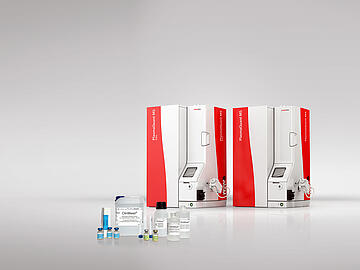
IVD validated kits for a future proof ICP-MS based analysis of human samples
Sun 17 Dec, 2023
IVD validated kits for a future proof ICP-MS based analysis of human samples
Laboratories, particularly in human and in vitro diagnostics, demand precision and swift delivery of reliable results to physicians. Adhering to stringent quality and safety standards, along with ensuring seamless processes in the in vitro diagnostics trade, is crucial for maintaining a high level of health protection.
To ensure this, the European Union introduced a new directive in 2022, the IVD Regulation EU 2017/746 (IVDR), which affects all laboratories that perform IVD tests. To comply with this directive, laboratories have to fulfill stricter requirements, including adherence to quality management guidelines through regular test monitoring and documentation of results.
In addition, the directive emphasizes the promotion of innovation in the field of IVD. This enables laboratories to rapidly adopt new technologies to improve patient care. In particular, the IVDR mandates laboratories to prioritize market-available products for IVD tests and use materials validated by manufacturers for the intended purpose if accessible.
Challenges
Although the new directive is a positive milestone, in practice it represents an enormous challenge for laboratories. By 2028 at the latest, they will have to comply with all the requirements of the IVDR, which has become mandatory. The transition to the IVDR may require significant adjustments to existing processes, quality management systems and documentation practices and presents laboratories with logistical and operational challenges.
Manufacturers of in-vitro diagnostics are responding by developing and providing IVDR-certified products to reduce the burden on laboratories.
ICP-MS as a promising analytical technique
To analyze human body fluids and tissues, different techniques are used depending on the analytes. To determine metal concentrations in human samples, inductively coupled plasma mass spectrometry (ICP-MS) is now increasingly being used, replacing atomic absorption spectrometry (AAS), which was previously the predominant method in this field of application.
With the large number of elements and the very low concentrations that need to be determined in human samples (e.g. blood, urine, serum, plasma), ICP-MS offers a versatile and fast analysis. The main advantages are the multi-element capability, which enables simultaneous measurement and therefore short measurement times, as well as the significantly higher sensitivity compared to other elemental analysis techniques.
But also for laboratories using ICP-MS, the IVDR requires that they use certified products whenever possible and only use in-house developed tests if certified alternatives are not available or do not offer equivalent performance. These requirements are causing many laboratories to reorganize their techniques and processes.
IVDR compliant kits for elemental analysis
There is already an IVD kit for elemental analysis of plasma and serum using ICP-MS. It contains all solutions and reference materials (calibrators) required for the analysis of 28 trace elements in serum and plasma using ICP-MS and is IVDR-ready certified. This kit has been validated through a process in which its effectiveness was tested in comparison with known reference methods, among other things.
The use of these certified kits in the analysis of human samples helps to improve patient care and facilitate medical decision-making.
Validated IVD kits from RECIPE and ICP-MS devices from Analytik Jena
In order to enable its customers to work in a future-proof and economical IVDR-compliant manner, Analytik Jena has verified an IVDR kit for use with the PlasmaQuant MS devices together with RECIPE.
The PlasmaQuant MS series from Analytik Jena fulfills the high demands for reliable, precise analysis with high throughput. The ClinMass® Complete Kit enables IVDR-compliant quantitative analysis of the following chemical elements from human plasma and serum with the PlasmaQuant MS series: Ag, Al, As, Au, Ba, Be, Bi, Cd, Co, Cr, Cu, Fe, Hg, I, Li, Mg, Mn, Mo, Ni, Pd, Pt, Sb, Se, Sn, Ti, Tl, V, Zn.
The verification of the ClinMass® Complete Kit with the PlasmaQuant MS from Analytik Jena showed recoveries of 90 - 110 % for most trace elements, with recoveries within the control range for all 28 elements analyzed. This underlines the compatibility of ready-to-use IVD kits with the single quadrupole ICP-MS PlasmaQuant MS. Using the IVD kit together with the PlasmaQuant MS offers users optimized workflows and reduced operating costs. Another advantage of Analytik Jena's ICP-MS systems is the economical consumption of argon. They consume only about half as much argon as similar devices, which can lead to cost savings of up to €60,000 over a period of 10 years for 100 samples measured per day.
The combination of RECIPE ClinMass® Complete Kits and the PlasmaQuant MS from Analytik Jena allows even the lowest element concentrations to be accurately determined. The patented ReflexION ion mirror for 90° deflection and 3D focusing of the ion beam provides the necessary sensitivity. This enables low detection limits in the ng/L range in the measurement modes without gas and iCRC. The likewise patented integrated collision reaction cell (iCRC) of the PlasmaQuant MS device ensures effective interference management. Polyatomic interferences with strongly interfered isotopes can thus be eliminated.
A detailed description of the application can be found in the AppNote below. This work can serve as a basis for the validation of the IVD kit for trace element analysis of serum and plasma by one-quadrupole ICP-MS.
AppNote: Determination of Trace Elements in Blood and Plasma Using ICP-MS Applying Ready-to-Use ICD Kits
Leave a comment
Write new comment
Contact us
The newsletter of Analytik Jena frequently keeps you posted about:
- News
- Trends and developments
- Events

Comments (0)
No comments found!